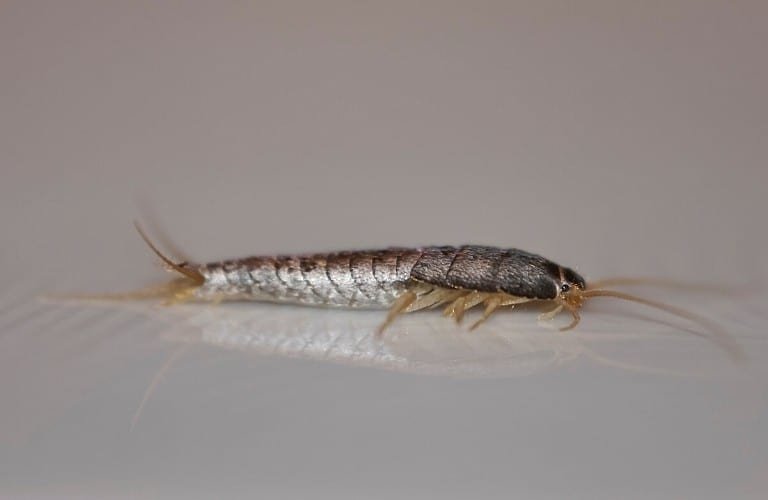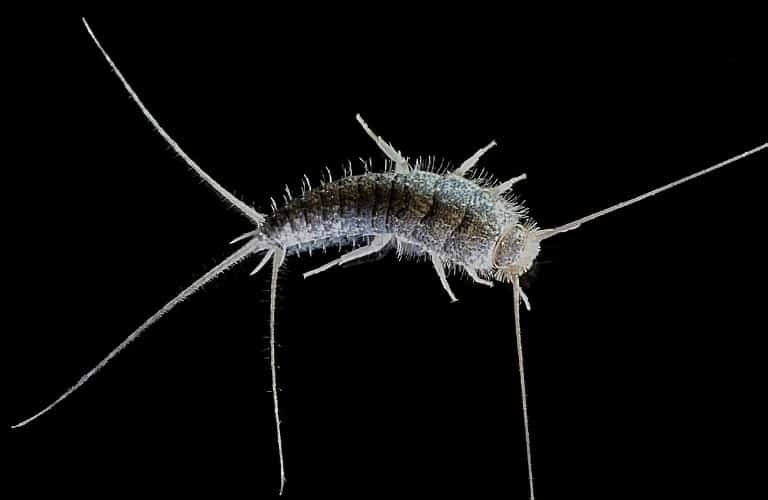If your home is humid, you’ll probably have silverfish at least once. You might not spot them right away because they like to hide in dark, humid corners.
Is it bad to have silverfish? Although silverfish can’t transmit disease or hurt you, they will destroy many items in your home, such as food, books, fabrics, and plaster. However, the presence of silverfish can alert you to a leak or water damage that may have otherwise gone unnoticed.
Let’s take a look at what it may indicate if you have silverfish along with some ways to remove them from your home.
What Are Silverfish?
Silverfish are silver insects that look a little bit like fish when they crawl around. They can run pretty fast and crawl up most surfaces.
They prefer humid environments and won’t usually be found in dry climates unless your home is humid.
Silverfish are nocturnal and are usually just an inch long, so they might be hard to spot if you’re not looking for them. They’re gray and will appear scaly or hairy.
Silverfish Are a Sign of a Problem
Silverfish aren’t fun to have around, but it can be a good thing to spot them simply because they’re usually found around water damage and leaks.
If you don’t routinely inspect your pipes, attic, basement, and areas under sinks, you might not know about water problems right away.
If you happen to spot a silverfish scurrying across the floor or notice that some items have been chewed through, then that’s a clear indicator that something is up.
The best way to keep silverfish out is to make sure your home stays dry.
If you don’t routinely check for water damage, make it a habit to periodically check under sinks, in the basement, around boilers, and the roof.
Since silverfish can climb, it’s possible for them to inhabit the attic if there’s water damage caused by a leak in the roof.
Damage Done by Silverfish
Silverfish won’t harm humans. They aren’t known to transmit diseases or bite. They will, however, cause damage to your property.
What They Do
Silverfish like to eat. They’ll eat through almost anything that is starchy and has carbohydrates.
If you notice that books or boxes have been chewed up, it’s a sign that silverfish are present.
The insects might also worsen allergies for some people.
Silverfish molt several times throughout their lives, and they leave behind the exoskeletons that they shed.
When these linger around your home, it can irritate you if you have bad allergies.
It’s important to vacuum all over your home once you spot silverfish so you can dispose of what they may have left behind.
What They Eat
Silverfish will eat almost anything containing carbs, sugar, and starches.
If your pantry is humid, store items like flour, cereal, and pasta in airtight boxes so they can’t get to the food.
They’ll eat through cardboard and cloth packaging, especially if they happen to get wet.
Silverfish also like to eat crumbs of food that get dropped on the floor.
If you eat in rooms with carpet or rugs, you should vacuum them frequently, at least once a week, so you won’t be inadvertently leaving a feast for the bugs.
They’ll also eat carpets, so those could take some damage, too.
Silverfish will also go after books because they like the paper and the glue in the binding. Depending on the material, they might also chew on the covers.
If you store your books in a dark room or in a basement, you’ll probably find damaged pages at some point.
Pick up the books and dust them and the shelf frequently to avoid making a comfortable environment for the pests.
Your closet might be an attractive place for them to hang out as well.
They eat cotton and many synthetic fabrics, so if your closet is dark and humid enough for them, they’ll crawl up to your clothing so they can find something to eat.
They’ll also eat:
- Leather.
- Plaster.
- Coffee grounds.
- Dandruff.
- Dead insects.
- Hair.
- Soap.
If you have a known silverfish problem, you should keep items in airtight containers as much as possible until you notice the insect population going down.
Items you use every day or those that are kept in dry areas aren’t that much of a concern.
It’s really just the items that aren’t used as often that are kept in the dark rooms that you should be concerned about.
For more information about the silverfish’s favorite snacks and the damage that they can do to your belongings, be sure to check out this article.
How Did I Get Silverfish?
You might be confused about how you got silverfish, especially if you live in a dry area.
That’s okay – the most common way for silverfish to get into your home is by bringing them in yourself.
If you recently brought in a box from someone else’s home or storage or maybe an old bag, that’s probably how they got inside.
In humid areas, it’s possible for silverfish to crawl into your home through little crevices you don’t know about.
It’s also possible they snuck through a door or window while it was open.
If your home has rotting wood because of water damage, that’s for sure a way they can get inside.
How to Stop the Silverfish
Prevention is the best way to keep silverfish out of your home.
In fact, we have an entire article dedicated to this very topic. You can find it here.
They’re drawn inside by ideal conditions, so you should keep your home unappealing to them.
A few ways you can do this include:
Keep Your Home Dry
Make it a routine to check for leaks if there are areas in your home that aren’t frequently used.
Leaks are often hard to detect at first since they start with a slow drip, and leaks in areas only visited infrequently aren’t usually discovered until it’s too late.
Repair Water Damage Immediately
The second you spot water damage is the second you should start figuring out how to fix it.
Whether it’s hiring a service or using duct tape until you find a more permanent fix, leaks and water damage need to be tended to as soon as possible.
Keep Stored Items in Airtight Containers
Plastic containers, like this 12 pack by IRIS USA, are the best option since silverfish can’t chew through them.
No products found.
No products found.
If you need to store books, clothing, bathroom supplies like brushes and soaps, or linen for a lengthy period of time, use plastic containers with locking lids.
You can use glass jars or airtight food storage containers (these are fantastic) in the pantry for items that are stored in cardboard so the silverfish can’t chew through them.
Using a DIY essential oil spray in areas that you frequently spy silverfish can help protect your food and belongings.
Wiping down surfaces with diluted bleach can aid in the battle too. Read this to learn more.
Dry Out the Air
You don’t want a humid home if you have silverfish.
Humidity is the perfect environment silverfish look for, and they’ll happily make your house their home if you keep it humid.
Use a dehumidifier, like this one by Waykar, if necessary, and ventilate bathrooms after a hot shower.
Inspect What You Bring Home
If you’re bringing home a cardboard box of clothes, books, or family heirlooms to keep in the basement, check the boxes thoroughly before you bring them inside.
Silverfish might be hiding underneath the stuff, and they’ll crawl out and invade your home once they feel it’s safe to come out.
Remember, this is the most common way for silverfish to find their way into your home.
Make Outdoor Areas Uninviting
Silverfish aren’t always a problem outdoors, but there are a few preventative measures you can take to make sure they stay away from your home. If they linger outside, they’ll probably find their way inside.
- Clean up debris – Don’t let leaves or wood planks remain on the ground near your home for too long. Silverfish will make these places their home.
- Remove standing water – The moisture will attract the insects toward your home, and they’ll eventually find their way inside.
- Seal up cracks – Cracks on the outside of your home are entry points for silverfish. Use silicone caulk to close up these spaces so they can’t get in.
If you already have a problem with silverfish, either indoors or outside, head over to our article “How To Get Rid of Silverfish” for strategies and recommended products.
Eliminating silverfish isn’t as hard as you might think, and there are several effective traps, even DIY traps, that can help a great deal. Click here for more information.
Conclusion
Silverfish can be annoying pests, especially when you see them run for cover every time you turn on a light.
They can’t hurt you, but they might set off your allergies when they molt their exoskeleton or might make you scream when you spy them.
They’ll also chew up your stuff, so use preventative measures to keep them away.
If you still have questions or concerns about dealing with silverfish, you’re not alone. That’s why we have a section dedicated solely to silverfish.
Don’t miss out on all the tips and tricks for banishing these pests for good.



